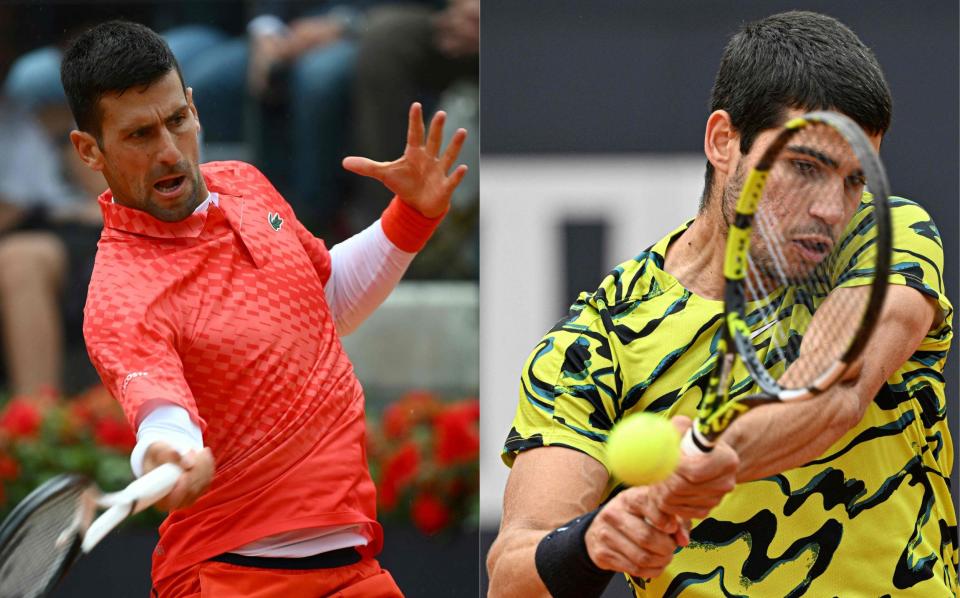Novak Djokovic v Carlos Alcaraz: Order meets chaos in the most consequential match of the year

Alain Prost v Nigel Mansell. Steve Davis v Alex Higgins. Germany v Brazil. In these great sporting rivalries, one party brings artistry, flair and unpredictability, while the other thrives on discipline and control.
Now tennis is awaiting a classic instance of its own. Novak Djokovic (order) and Carlos Alcaraz (chaos) are about to meet in the most anticipated grand slam semi-final since Roger Federer and Rafael Nadal faced off four years ago.
The appeal of their marquee showdown – which is expected to be scheduled on Friday afternoon – extends beyond the contrast of styles.
This encounter has huge symbolic value, especially as the winner will be a shoo-in to collect the Coupe des Mousquetaires after Sunday’s final.
Should Alcaraz win, he will have overcome one of the “Big Three” tennis legends over the full distance (best of five sets) for the first time. It would be a rite of passage, a trial by combat, a moment that says “The king is dead, long live the king!”
But if Djokovic were to win, he would once again be shoring up his aura of invincibility at the majors, as well as virtually guaranteeing a record-breaking 23rd major on the court that Rafael Nadal (who is surely stuck forever on 22) has made his own.
If the outcome feels unpredictable, that is partly because we have no data. Djokovic – who turned 36 last month – and 20-year-old Alcaraz have taken turns to hold the world No 1 ranking since last year’s US Open. Bizarrely, though, they haven’t played each other at all over this period.
There remains only a single entry on the Djokovic-Alcaraz head-to-head chart: a thrilling three-setter, claimed by Alcaraz at the last gasp, which dates back 13 months to the unique high-altitude conditions of Madrid last year.
The last nine months have resembled the second act of a romcom, in which the two parties – having sparked initially at what directors call “the meet-cute” – keep finding ever-more unlikely reasons not to get together.
While the delay has felt hugely frustrating, it has also cranked up the tension for Friday’s showpiece. What happens here could shape the dynamic of men’s tennis for the next couple of seasons.
The bookmakers have Alcaraz as their favourite – a surprising choice, perhaps, given that he has only 35 wins to his name at the majors, including a maiden title at last year’s US Open. Djokovic has 353.
But then Alcaraz is a beguiling figure to watch. His range of options is so broad that any computerised version of Carlos Alcaraz Tennis (there’ll be one along soon, no doubt) will need an extended, button-heavy controller.
His favourite stroke is the drop shot, especially when played off the forehand side – and he makes it look so stylish and straightforward that other players have started emulating him. (ATP statistics show that ten per cent more forehand drop shots have been deployed on the tour since Alcaraz emerged.)
Then, when he’s not dragging you towards the net, he’s pushing you towards the back fence with the fizziest forehand since Nadal’s.
It’s a brutal combination, which utterly befuddled the 2021 French Open finalist Stefanos Tsitsipas during Tuesday’s quarter-final. Having succumbed feebly in 2hr12min, Tsitsipas proffered a lame-sounding excuse about having taken too much melatonin – a sleep hormone – earlier in the day.
Earlier the same afternoon, Djokovic had seen off Russia’s Karen Khachanov in four sets. Although it was a patchy performance, there was at least an hour in the middle of Djokovic’s 4-6, 7-6, 6-2, 6-4 victory when he had the ball under remote control.
Typically, that purple patch started with a tie-break, which he won 7-0. Djokovic’s greatest gift is knowing when to dial in with his full concentration. During this tournament, he has come through five tie-breaks without making a single unforced error.
Hence the expectation of a clash of cultures on Friday, with the smiling magician coming up against the most clinical executioner of this or any other era.
If the match is over quickly, that probably means that Alcaraz has overwhelmed Djokovic with his extraordinary attacking repertoire. If it goes long, one can imagine Djokovic slowly suffocating his young rival with tennis’s answer to the crocodile roll.
It is now at least a decade since we began to ask about a possible “changing of the guard” in men’s tennis. Djokovic has done more than anyone to make sure that the citadel has never truly been breached.
But in Alcaraz he faces a hungry and fearless young challenger, who was described by John McEnroe last week as “the best 20-year-old I’ve ever seen”. So while Friday’s meeting may not be a final, it still feels like the most consequential match of the year.

 Yahoo Sport
Yahoo Sport 





































